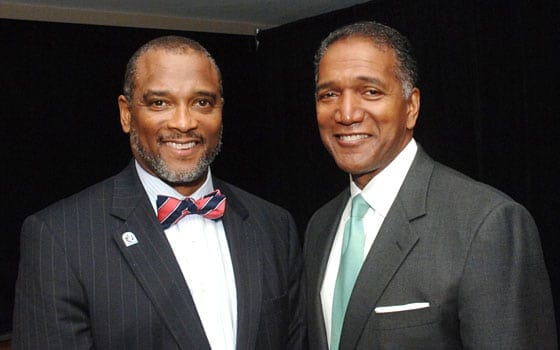
Fred McKinney, the CEO of The Greater New England Minority Supplier Development Council (GNEMSDC), is quietly making a mark on minority business development.
Just last month, the U.S. Department of Commerce announced that the GNEMSDC would receive about $1.4 million in funding over the next five years to manage a federal program designed to increase minority businesses.
In addition, GNEMSDC has merged with the Initiative for a New Economy (INE), the business group started in 2006 that proudly proclaimed it would improve the state of minority-owned businesses throughout the state.
By all accounts, INE did just that. Armed with about $1 million committed by the city of Boston, the United Way of Massachusetts Bay, the Boston Foundation, Liberty Mutual Group and Blue Cross Blue Shield Massachusetts, INE helped create hundreds of jobs and millions of dollars in added revenue for minority-owned businesses in Massachusetts.
McKinney couldn’t be more pleased with both the federal grant and the merger with INE.
“Every once in a while, something big happens,” McKinney said before explaining that GNEMSDC had applied for the grant through the Minority Business Development Agency (MBDA) at about the same time INE’s board of directors was reevaluating their strategies to take its mission to the next level.
The grant and the merger, McKinney said, will enable GNEMSDC to work “very aggressively on a much larger scale.” McKinney said it was also important to note that GNEMSDC is adding about $600,000 of its own money to further bolster the $1.4 million federal grant, bringing the total operating budget of Boston’s MBDA site to about $2 million.
“The GNEMSDC is fully involved and invested in the program,” McKinney said.
With help from the new minority business centers, minority-owned businesses can learn how to increase their competitiveness and help grow the U.S. economy.
The MBDA, an arm of the U.S. Department of Commerce, launched centers in Minneapolis, Minn. and Riverside, Calif. in addition to Boston.
The new centers will provide assistance by offering strategic business services focusing on large public and private contracts, financing and access to global markets.
McKinney said the goal for the Boston center is to reach $100 million in revenue over the next five years. With more than 500 certified minority businesses across New England, as well as other high profile members across the country, McKinney said he is quite confident that GNEMSDC will attain that goal.
Milton Benjamin, the former CEO of INE explained that the merger “represents a platform upon which INE’s work, under a new name, should scale up dramatically with the right resources behind it.”
But Benjamin also sounded a cautionary note. “… those that care about minority business development and equity must remain vigilant,” he warned. “We are not there yet and the impediments are still many. The State and the region are making slow progress in diversity but it is moving in the right direction.”
In 2005, about a year before the start of INE, Menino helped sponsor a comprehensive study of minority businesses throughout the state. The results provided a benchmark — and proof of what most already knew — of the gap between white-owned and minority-owned firms.
According to the study, the average minority-owned business in Massachusetts had two-thirds fewer employees and one-fifth the revenue of the average white-owned firm.
The 25 largest minority-owned companies in the state had a combined revenue of slightly over $1 billion, with mean revenue of about $41 million. In comparison, the top 25 companies (none of which are minority-owned) represented over $117 billion in revenue, with mean revenue of $2.6 billion.
The numbers got worse. Of the 60,000 minority-owned firms, only 1,600 were considered to be ready to deal with major corporations. It’s a small wonder that only 27 percent of the minority-owned companies surveyed for the study by the Boston Consulting Group believed that business has improved over the years in Boston.
All of that is changing, in large part due to the efforts of INE and GNEMSDC. Back in 2009, the New England Minority Supplier Development Council merged with its Connecticut counterpart to form GNEMSDC.
The GNEMSDC is an affiliate of the National Minority Supplier Development Council, a network of 38 regional councils across the country that boasts over 3,500 total corporate members and more than 15,000 certified minority-owned businesses in its network. At the time of the merger, the NMBSC facilitated $104.7 billion in corporate member purchases from minority-owned business enterprises.
McKinney said he is ready for the challenge. “ … [We are] excited,” McKinney said. “We believe that the center will lead to minority business enterprise growth, greater employment and more economically vibrant and diverse communities.”






